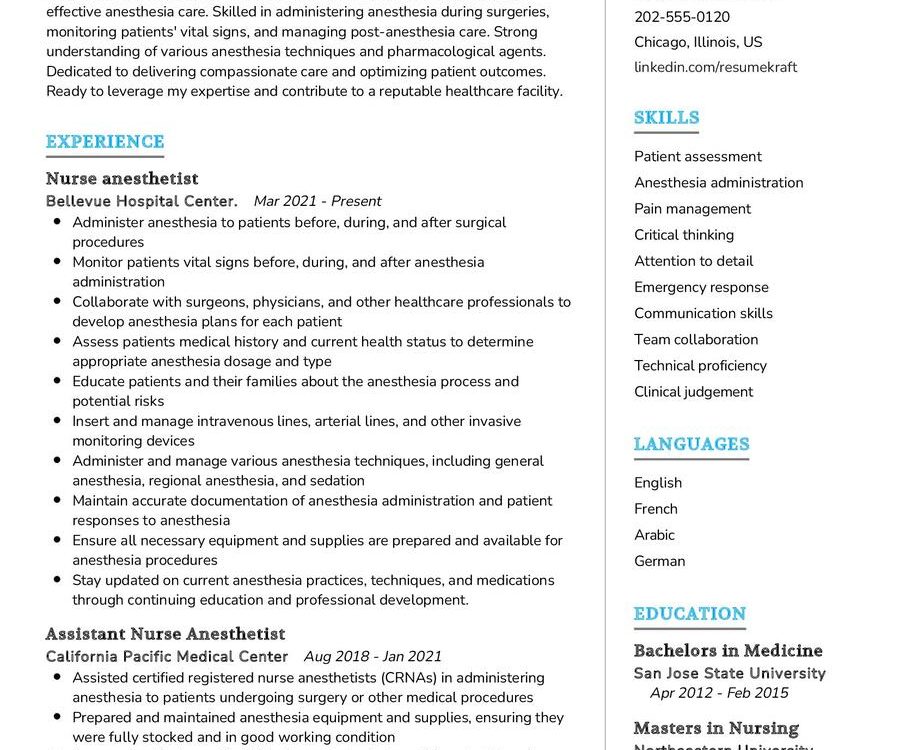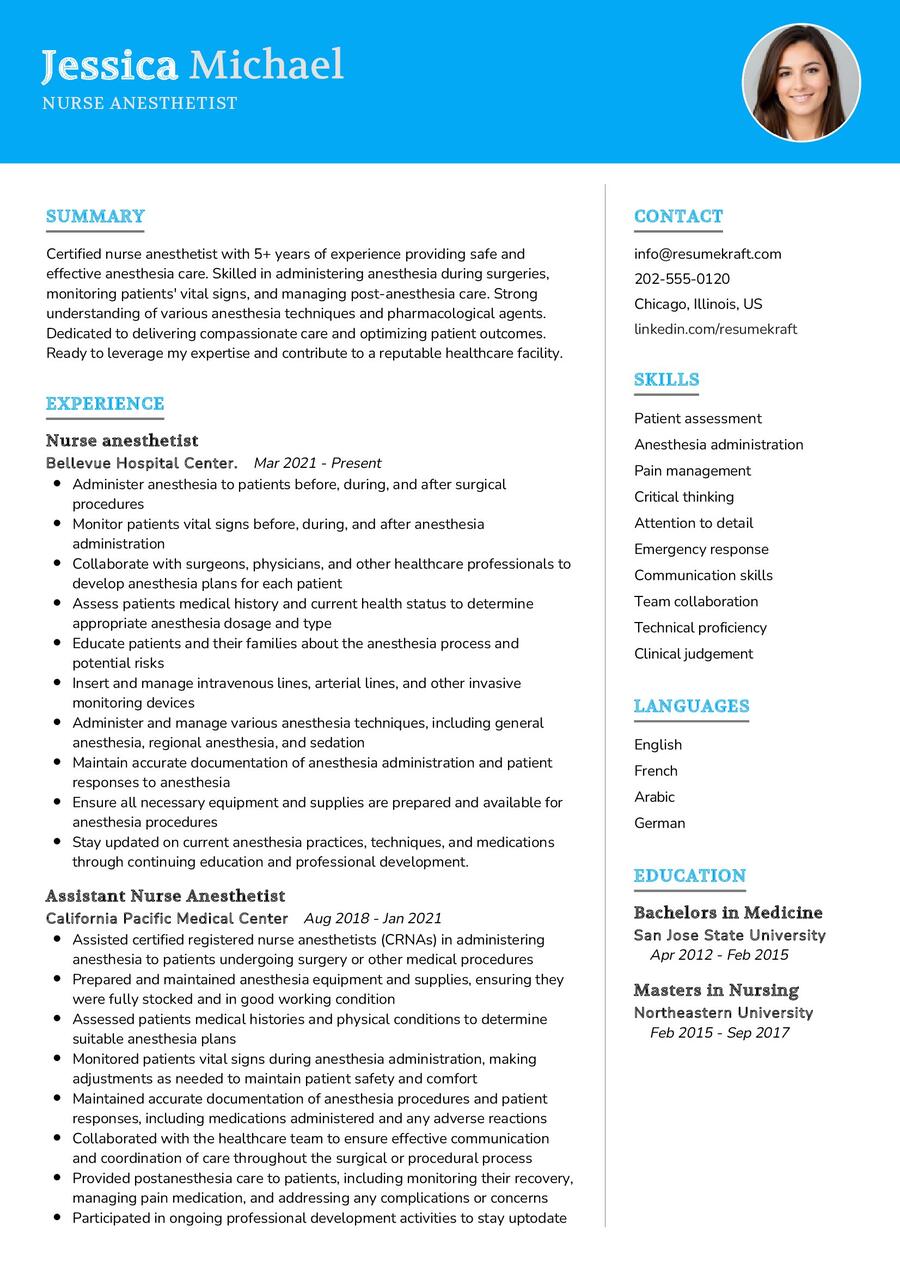Exploring the Role of a Nurse Anesthetist
As the healthcare landscape evolves, the role of a Nurse Anesthetist has become increasingly vital in providing quality patient care. This position demands a unique blend of medical expertise and compassion, ensuring patients receive safe and effective anesthesia care. Let’s delve into the multifaceted world of a Nurse Anesthetist, exploring the responsibilities, requirements, and key aspects that define this crucial healthcare role.
Job Requirements for a Nurse Anesthetist
Becoming a Nurse Anesthetist involves meeting stringent requirements, showcasing a commitment to patient well-being and continuous professional growth. The journey requires a solid educational foundation and a set of specialized skills. Here are the prerequisites for embracing the role of a Nurse Anesthetist:
- A Bachelor’s degree in Nursing, followed by a Master’s or Doctoral degree in Nurse Anesthesia.
- Licensure as a registered nurse (RN) and completion of a Nurse Anesthetist program accredited by the Council on Accreditation of Nurse Anesthesia Educational Programs (COA).
- Experience in critical care nursing, demonstrating a strong clinical background.
- Advanced Cardiovascular Life Support (ACLS) and Pediatric Advanced Life Support (PALS) certifications.
- Excellent communication and interpersonal skills, essential for working collaboratively with the healthcare team and comforting patients.
- An analytical mindset and the ability to make quick, informed decisions in high-pressure situations.
Securing additional certifications in specialized areas such as pain management or trauma care can further enhance your profile in the competitive healthcare field.
Responsibilities of a Nurse Anesthetist
The role of a Nurse Anesthetist is diverse, encompassing a wide range of responsibilities that contribute to the well-being of patients undergoing surgical procedures. Let’s unravel the core duties that define this crucial healthcare role:
- Administering anesthesia to patients before surgery, ensuring a pain-free and safe experience.
- Assessing patients’ medical history, allergies, and current medications to determine the appropriate anesthesia plan.
- Maintaining patients’ vital signs during surgery, adjusting anesthesia levels as needed.
- Collaborating with surgeons, anesthesiologists, and other healthcare professionals to ensure seamless patient care.
- Monitoring patients post-surgery, providing pain management and ensuring a smooth recovery process.
- Staying updated on advancements in anesthesia techniques and technologies for continuous improvement in patient care.
Each responsibility comes with its unique challenges, requiring a Nurse Anesthetist to navigate complex medical scenarios with skill and compassion.
Nurse Anesthetist Resume Writing Tips
Crafting a resume as a Nurse Anesthetist is an opportunity to showcase your expertise, compassion, and dedication to patient care. Here are some tips to create a compelling resume that stands out:
- Highlight your clinical experience, detailing the range of surgeries and procedures you have been involved in.
- Emphasize your ability to work under pressure, showcasing instances where you made critical decisions in challenging situations.
- Showcase your commitment to ongoing education, listing relevant workshops, certifications, and conferences attended.
- Include patient outcomes and success stories, demonstrating your impact on providing safe and effective anesthesia care.
- Personalize your resume for each application, aligning your skills and experiences with the specific job requirements.
Your resume is a reflection of your dedication to patient care and your contributions to the healthcare field.
Nurse Anesthetist Resume Summary Examples
Your resume summary is the opening act of your career story, setting the stage for the value you bring as a Nurse Anesthetist. Here are some examples to inspire you:
- “Dedicated Nurse Anesthetist with over 8 years of experience, committed to delivering safe and compassionate anesthesia care for diverse surgical procedures.”
- “Experienced anesthesia professional skilled in assessing complex medical cases, ensuring optimal patient outcomes in both routine and emergency surgeries.”
- “Detail-oriented Nurse Anesthetist with a focus on continuous improvement, staying abreast of the latest anesthesia techniques and technologies.”
Your summary is a snapshot of your commitment to excellence and your passion for ensuring patient safety during medical procedures.
Create a Strong Experience Section for Your Nurse Anesthetist Resume
Your experience section is the heart of your resume, illustrating the breadth and depth of your contributions to patient care. Here are some examples to guide you:
- “Administered anesthesia for a variety of surgeries, including cardiac, orthopedic, and neurosurgical procedures, ensuring patient comfort and safety.”
- “Collaborated with surgical teams to develop anesthesia plans, contributing to successful outcomes in high-risk and complex cases.”
- “Led initiatives to implement updated anesthesia protocols, improving efficiency and patient care standards in the anesthesia department.”
Each experience is a chapter in your healthcare journey, highlighting your role in enhancing patient care and safety.
Education Section for Your Nurse Anesthetist Resume
Your educational journey is the foundation of your career, showcasing your dedication to acquiring the necessary knowledge and skills. Here’s how you can present your educational milestones:
- Doctor of Nursing Practice in Nurse Anesthesia, XYZ University, a comprehensive program emphasizing advanced anesthesia techniques, 2015.
- Master of Science in Nursing, ABC University, a solid foundation in nursing principles and patient care, 2012.
- Registered Nurse (RN) License, State Board of Nursing, demonstrating your eligibility to practice as a nurse anesthetist, 2010.
Your education section is a testament to your commitment to ongoing learning and your journey to becoming a skilled Nurse Anesthetist.
Nurse Anesthetist Skills for Your Resume
Your skill set is your toolkit, filled with the abilities and qualities that make you an exceptional Nurse Anesthetist. Here are the essential skills for success in this role:
Soft Skills:
- Compassion and empathy, providing reassurance and comfort to patients undergoing anesthesia.
- Effective communication, collaborating seamlessly with healthcare teams and explaining procedures to patients.
- Critical thinking, making informed decisions in high-pressure situations to ensure patient safety.
- Attention to detail, monitoring vital signs and adjusting anesthesia levels with precision.
- Adaptability, navigating unexpected challenges during surgeries and recovery.
Hard Skills:
- Anesthesia administration, proficient in administering various types of anesthesia for different surgical procedures.
- Monitoring and assessment, adept at evaluating patient responses during surgery and postoperatively.
- Pain management, skilled in providing effective pain relief strategies for patients in the recovery phase.
- Collaboration, working seamlessly with surgeons, anesthesiologists, and other healthcare professionals.
- Continuous learning, staying updated on advancements in anesthesia techniques and technologies.
Each skill is a tool in your arsenal, contributing to your effectiveness in delivering anesthesia care.
Common Mistakes to Avoid When Writing a Nurse Anesthetist Resume
Crafting a Nurse Anesthetist resume requires attention to detail and an understanding of what healthcare employers are looking for. Here are common mistakes to avoid:
- Using generic language, failing to showcase your unique skills and experiences as a Nurse Anesthetist.
- Overlooking the impact of your contributions, focusing solely on job duties rather than outcomes and achievements.
- Neglecting to tailor your resume for each application, missing the opportunity to align your skills with specific job requirements.
- Omitting relevant certifications and training, downplaying your commitment to continuous professional development.
- Failing to proofread, a mistake that can undermine your professionalism and attention to detail.
Avoiding these mistakes will help you create a resume that truly highlights your capabilities as a Nurse Anesthetist.
Key Takeaways for Your Nurse Anesthetist Resume
As we conclude this comprehensive guide, let’s recap key points to keep in mind while crafting your Nurse Anesthetist resume:
- Emphasize your clinical expertise, showcasing your experience in administering anesthesia for various surgical procedures.
- Highlight your commitment to continuous learning, underscoring relevant certifications and training.
- Showcase your impact, detailing successful anesthesia plans and contributions to patient outcomes.
- Personalize your resume for each application, aligning your skills with specific job requirements.
Your resume is not just a document; it is a testament to your dedication to patient care and your role as a key player in the healthcare team. Best of luck in your journey as a Nurse Anesthetist!
Finally, feel free to utilize resources like AI Resume Builder, Resume Design, Resume Samples, Resume Examples, Resume Skills, Resume Help, Resume Synonyms, and Job Responsibilities to create a standout application and prepare for the Nurse Anesthetist job interview.


